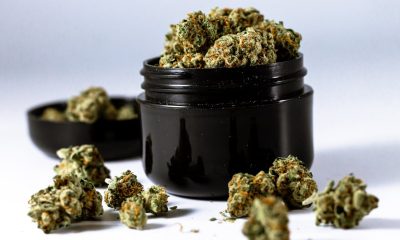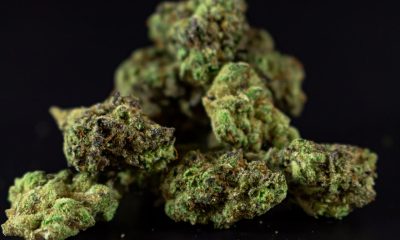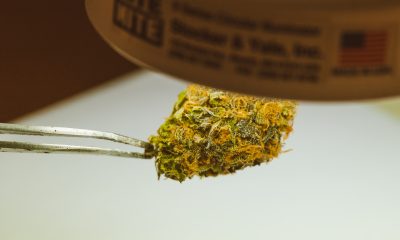Cannabis
Recreational Cannabis in Argentina, an Unavoidable Debate for the Congress in the Making
Argentine President Alberto Fernandez legalized the cultivation of up to six cannabis plants for medicinal use. However, the Drug Law in force since 1989 punishes possession for personal consumption with prison sentences of between one month and two years, and up to 15 years if there is evidence of commerce. Alberto Fernandez, also a lawyer, says the current legal framework generates a deep imbalance between the legality of alcohol and the illegality of cannabis

In mid-August, Argentine President Alberto Fernandez gave a relaxed interview to Filo News in which he expressed his support for “opening the debate” to legalize recreational cannabis consumption in Argentina.
“My first temptation is to put an end to hypocrisy. Cannabis harms, tobacco kills, and alcohol degrade human being. If tobacco and alcohol are legal, why cannabis should be illegal,” said Fernandez. His most recent record backs him up. Under his government, the cultivation of up to six cannabis plants for medicinal use was legalized -for those who register- and a bill was sent to Congress to promote the industrial production of cannabis, its seeds, and derivatives.
Consequently, the electoral campaign for the primaries that will elect the candidates to renew seats in the National Congress and provincial parliaments had for the first time cannabis for recreational use among its main topics.
The Argentine government believes that with the new activity it can create some 10,000 jobs and earn around 50 million dollars a year, and this is its main motivation with respect to the plant.
The recreational use of cannabis is the only approach that has not yet been debated in the plenary of Congress, which on September 12th begins its electoral path to renew seats.
“After other achievements such as equal marriage, the gender identity law and some others related to immigration, I think that in terms of human rights this government has already made progress with the issue of abortion, and cannabis is now in the lead to be an issue to be addressed by the new composition of Congress,” Mariano Fusero, president of the non-governmental organization Reset (specialized in drug policy and human rights), told Sputnik.
A recent survey conducted among 64,000 people aged 16 to 92 living in the 24 national districts revealed that 84.2% of the total use cannabis recreationally
However, the Drug Law in force since 1989 punishes possession for personal consumption with prison sentences of between one month and two years, and up to 15 years if there is evidence of commerce.
Fusero warned that before all this it is necessary to achieve “a decriminalization of consumption, beyond the regulation of cannabis”, and pointed out that there is “some confusion in the political discourse.”
“When we talk about decriminalization we talk about figures associated with consumption, and when we talk about consumption, as recognition of individual freedoms, we are talking about any type of substance,” warned the lawyer.
Privileges to enjoy
The strong national campaign that last year achieved the law of abortion, safe and free in Argentina from the streets also managed to put on the agenda of debates the claim for a human right so far censored, in a society with strong religious roots: the right to enjoy.
From this point of view, Alberto Fernandez, also a lawyer, understands that the current legal framework generates a deep imbalance between the legality of alcohol and the illegality of cannabis. On the other side of the fence stands the pre-candidate for national deputy for the City of Buenos Aires, María Eugenia Vidal, who in a recent interview also gave her opinion about the upcoming debate.
“It is one thing to smoke a joint in [the Buenos Aires neighborhood of] Palermo and another in [the slum] 1-11-14, with drug dealers offering you,” said the former governor of the province of Buenos Aires (east).
The difference made by Vidal between the sumptuous neighborhood and the shantytown, both located in the Argentine capital, earned her criticism from numerous sectors. Among them, one that points out that the consumption of a substance for pleasure is a guarantee that you only have in Palermo where, supposedly, there are no drug dealers to offer you.
For Fusero, “the historical campaigns against cannabis were crossed by strong anti-hedonist pressure. Many of these substances have the capacity to produce pleasure, and pleasure is also a human right, and it is the right to people’s health and wellbeing. It is not something we have to trivialize.”
He also believes that in regulation it is important to have a state present, a model similar to that of Uruguay, Canada, and some states in the United States -not all, “so as not to leave the issue in the hands of marketing and corporations at the international level that already exist and try to monopolize the large-scale trade of cannabis.”
“If we sustain that business and commercial logic we are going to have disvaluable results in terms of public health, especially in consumption rates and encourage use through strategies based on propaganda,” he added. In simpler words, “we do not have to repeat with cannabis the same history we suffered from alcohol and tobacco.”
__
(Featured image by buecherjunge_dd via Pixabay)
DISCLAIMER: This article was written by a third party contributor and does not reflect the opinion of Born2Invest, its management, staff or its associates. Please review our disclaimer for more information.
This article may include forward-looking statements. These forward-looking statements generally are identified by the words “believe,” “project,” “estimate,” “become,” “plan,” “will,” and similar expressions. These forward-looking statements involve known and unknown risks as well as uncertainties, including those discussed in the following cautionary statements and elsewhere in this article and on this site. Although the Company may believe that its expectations are based on reasonable assumptions, the actual results that the Company may achieve may differ materially from any forward-looking statements, which reflect the opinions of the management of the Company only as of the date hereof. Additionally, please make sure to read these important disclosures.
First published in SPUTNIK, a third-party contributor translated and adapted the article from the original. In case of discrepancy, the original will prevail.
Although we made reasonable efforts to provide accurate translations, some parts may be incorrect. Born2Invest assumes no responsibility for errors, omissions or ambiguities in the translations provided on this website. Any person or entity relying on translated content does so at their own risk. Born2Invest is not responsible for losses caused by such reliance on the accuracy or reliability of translated information. If you wish to report an error or inaccuracy in the translation, we encourage you to contact us.

-

 Business6 days ago
Business6 days agoAmerica’s Debt Spiral: A $67 Trillion Reckoning Looms by 2035
-

 Crypto2 weeks ago
Crypto2 weeks agoBitcoin Reacts to Crisis: Price Swings Amid Israel-Iran Conflict
-

 Crowdfunding3 days ago
Crowdfunding3 days agoTasty Life Raises €700,000 to Expand Pedol Brand and Launch Food-Tech Innovation
-

 Biotech2 weeks ago
Biotech2 weeks agoDiscovery of ACBP Molecule Sheds Light on Fat-Burning Tissue Suppression and Metabolic Disease

























